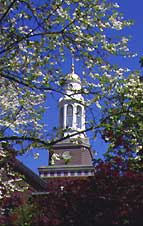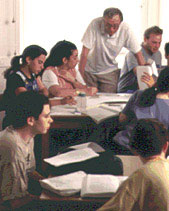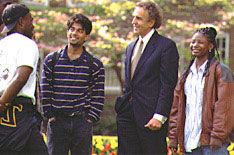
By Brita Rose
|
Academic excellence, intellectual discovery, and collaborative learning. These are just some of the features which characterize the Honors department at Brooklyn College, a dynamic new federation of honors programs, now known as the Honors Academy, which is located at 2231 Boylan Hall. 
President emeritus Vernon E. Lattin established the Honors Academy in 1996. Its origins however are rooted in the late 1950's when Professor Naphtali Lewis formed the first scholars program with the concept of serving eager, exceptional, and imaginative students in a small community atmosphere. This was subsequently joined by other honors programs, which have since combined under the direction of Professor Kenneth A. Bruffee to form the Honors Academy of today. The Academy now has several unique and challenging academic programs led by faculty mentors who guide students through their academic pursuits. Honors students receive priority registration, possible scholarships, career counseling, and access to all Academy facilities which boast a lounge, study room, and networked computer stations. The goal of the Academy is to give above average students a chance at reaching their potential and prepare them for their academic future. "In this multi-cultural community, we as a College try to meet the needs of all students. As well as being ethnically and racially diverse, the campus is also academically diverse in that, on the one hand we have many students who need special help, yet on the other hand, we have very bright students who would, if they could afford it, go to Yale" says Professor Bruffee. "What the Honors Academy offers, is a place for these gifted students here at Brooklyn College." 
In addition, the Academy provides valuable support for these students. Aside from offering educational focus, the Academy considers the interests, needs and welfare of the student, in what can often be an overwhelming environment. "The Ford Colloquium changed my college experience one hundred fold," one honors graduate shares. "Without it I would have lost valuable support, academically, emotionally and financially." Being such a large college, it is often difficult for students to connect and form relationships. Eventually students usually do make attachments through their major or a club, but it is hard for the academically ambitious to find peers. The Academy recognizes this, and offers a better quality to their experience here by enabling them to connect with like-minded students. The Brooklyn College Honors Academy is composed of seven programs: The B.A. - M.D. Program, in cooperation with the State University of New York Health Science Center at Brooklyn, accepts students from High school assuring them of entrance to medical school. The Dean's List-Departmental Honors Program gives candidates for departmental honors that are on Dean's List, access to the Honors Academy's facilities and resources. Engineering Honors Program, in cooperation with Polytechnic University, assures students entrance to one of the nation's finest technical universities for the final two years of engineering studies. The Ford Colloquium and the Mellon Minority Undergraduate fellowship help prepare students for academic careers. The Scholars Program provides a traditional liberal education with a modern interdisciplinary inclination. Lastly, The Special Baccalaureate Degree Program offers an intensive liberal education designed especially for exceptional adult students who have, without a college education, already distinguished themselves in responsible positions in business, industry, and government. Comprised now of approximately 300 multi-culturally diverse students, the Academy body continues to grow. It has reached, according to Professor Bruffee, an ideal size, and a spirit of unity that has also led to extra curricular activities such as a Christmas party and softball team to date. Plans also extend into the new millennium; by the year 2002, the Academy plans to host an honors reunion and to reach as many alumni as possible, from each of its programs. Stating the objectives of the recent re-structuring of the honors programs, Professor Bruffee explains, "Each of these programs has its own agenda. My mandate was to consolidate these people, federate the programs, and thereby broaden the base of honors at Brooklyn College for further expansion." Professor Bruffee continues, "Existing programs that were really honors level programs already, but were not recognized as such, like the Engineering Program and Special Baccalaureate Program, were thereby transformed to become more visible and accessible. The Academy makes honors at the college more visible and also makes it possible for us to address people with their applications in a coherent way." 
Far from standing alone, the Academy benefits greatly from the alliance between itself and the college's Ethyle R. Wolfe Institute for the Humanities. The institute holds public seminars, conferences, lectures and discussions, which are open to the city community as well as the campus body. The Academy also hosts seminars or colloquia within its programs, where students can share their discoveries and results. So through both the Academy and exposure to the Institute, students gain a taste for the academic life of graduate school and beyond. "The Academy offers more seminars than ever before, all of which are open to its members. That's the flag of the Academy." Professor Bruffee states. "This intellectually challenging interdisciplinary approach to study, which includes an honors project and senior thesis, allows students to stretch themselves in a way that most students do not experience." Some of the seminars scheduled for spring 1999 include "Dig We Must: Historical archaeology in the City" given by Professor Arthur Bankoff, Chariman of the Brooklyn College Archaeology department, and "Crossing Boundaries: Identity and Transnational Narratives" given by instructor Wendy Fairey. As one of the beacons of Brooklyn College, this Academy has helped to prepare many students for their academic future. "Having been part of the honors program," one graduate student said, "I knew what to expect at graduate school, and was not taken by surprise like my peers." Many honors students have continued on to prestigious graduate schools, including Yale, Oxford, Princeton, and Berkeley, to name but a few. 
"The Academy reflects the high quality of Brooklyn College as a whole. In constituting the Honors Academy there was no need to create new honors programs from whole cloth. In the college's forty-year-old Scholars Program it had a highly regarded, long established, well-organized model to build on" Professor Bruffee notes. "In establishing The Honors Academy the college identified and affiliated its many already existing small programs for exceptional students, giving these programs long deserved visibility, esteem, and operational support." Reflecting on the overall significance of the Academy, Vernon E. Lattin, president emeritus of Brooklyn College, states, "The Honors Academy is an important component of our educational excellence. It enables us to bring together the best students in Brooklyn and create communities of learning." |
Honors Academy Publication
Back to Main Page of The Flag of Excellence - The Honors Academy
Brooklyn College Web Site
Copyright © 1999, 1998 Brooklyn College.
All Rights Reserved.
 Freshmen may apply to the lower-division programs: The Scholars Program
and the B.A. - M.D. Program. Continuing students may apply to the two
upper-division programs: the Ford Colloquium and Mellon Minority Fellowship,
during their second year, and to the Dean's List-Departmental Honors
Program at the beginning of their third year. Acceptance is based upon
academic merit, and accepted students must maintain a G.P.A of 3.5 or
higher in order to remain in the programs, the entrance requirements
of which vary slightly. Students may choose to enroll in more than one
program if they desire and are up to the challenge. Application forms
for each honors program, can be picked up at 2231 Boylan Hall.
Freshmen may apply to the lower-division programs: The Scholars Program
and the B.A. - M.D. Program. Continuing students may apply to the two
upper-division programs: the Ford Colloquium and Mellon Minority Fellowship,
during their second year, and to the Dean's List-Departmental Honors
Program at the beginning of their third year. Acceptance is based upon
academic merit, and accepted students must maintain a G.P.A of 3.5 or
higher in order to remain in the programs, the entrance requirements
of which vary slightly. Students may choose to enroll in more than one
program if they desire and are up to the challenge. Application forms
for each honors program, can be picked up at 2231 Boylan Hall.